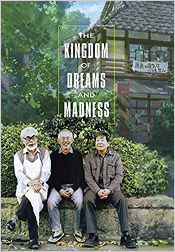Kingdom of Dreams and Madness, The (DVD Review)

Director
Mami SunadaRelease Date(s)
2013 (January 27, 2015)Studio(s)
Studio Ghibli (GKids/Cinedigm)- Film/Program Grade: A
- Video Grade: B
- Audio Grade: B
- Extras Grade: C
Review
Part behind-the-scenes documentary, part portrait of a studio and a filmmaker at a crossroads, Mami Sunada’s The Kingdom of Dreams and Madness is a surprisingly revealing look at the inner workings of Japan’s acclaimed Studio Ghibli and its legendary co-founder, Hayao Miyazaki. The film was shot during the making of Miyazaki’s latest animated feature, The Wind Rises (reviewed here on Blu-ray). It begins as a straightforward look inside the production, covering Miyazaki’s creative process and life at Ghibli. But as we spend time with the director and his closest associates, watching as Miyazaki meticulously sketches his storyboards for the film, things begin to take on a personal tone. Miyazaki chats with his assistant and Sunada as he draws, gradually revealing his thoughts, feelings, and insights about his life and art. At various points, Miyazaki becomes introspective, even philosophical – not just about filmmaking but occasionally other subjects too. Miyazaki talks about the world at large, the changes he’s observed in society, his father, his childhood, and his long relationship with collaborator Isao Takahata. We also see Miyazaki’s friend and producer, Toshio Suzuki, handling the studio’s business, encouraging his talent, and promoting Ghibli projects. Suzuki shares his insights throughout the film too, and Takahata makes an appearance towards the end to talk about his friendship/rivalry with Miyazaki. But the documentary never lingers too long on any one topic, continually shifting from back and forth from contemplative moments to show the continuing production and reveal other aspects of work at the studio.
Kingdom of Dreams takes on a serious tone though as it become clear that Miyazaki is, in many ways, a troubled man. He and Takahata are both in their seventies, facing the end of their long careers. While Miyazaki’s son Goro has directed two animated films of his own for Ghibli (Tales from Earthsea and From Up on Poppy Hill), he doesn’t seem especially driven to continue, having only reluctantly followed in his father’s footsteps. Miyazaki admits that some of the younger staffers at the studio don’t seem to appreciate the themes he explores in his films. Ghibli’s corporate partners in Japan and elsewhere have also begun to pre-emptively dictate which subjects the studio can explore in its films and which should be avoided. So Miyazaki has reached a point in his life where he’s questioning the choices he’s made. He appears resigned about the fate of his studio, convinced that when he and Takahata retire it will fall apart. In unexpectedly candid moments, Miyazaki wonders aloud whether his career has been worth the sacrifices and whether there's any real value to what he's accomplished. It also appears that he was deeply affected by the Tokyo earthquake, tsunami and nuclear accident at Fukushima, and that he’s troubled by the direction he sees the world heading in the 21st Century.
And yet… despite all of these inner doubts, Miyazaki remains ever playful, insightful, even stubbornly hopeful. There’s an interesting scene near the end of the film, when Suzuki and Miyazaki protégé Hideaki Anno (who voices the lead character in The Wind Rises) are driving home late one evening after the completion of the film. As they’re discussing the project, they reveal their pleasure that Miyazaki has decided at the last moment to change the ending so that that Anno’s character lives on. The decision, exemplified in the film’s promotional tagline (“We must try to live!”), reveals a reluctant but dogged sense of optimism that runs deeply in Miyazaki. Such moments help to ensure that The Kingdom of Dreams and Madness remains as uplifting as it is, at times, melancholy.
The DVD from Cinedigm and GKids includes the film in solid anamorphic widescreen video quality. Audio is Japanese Dolby Digital 5.1 only, with optional English subtitles. In addition to the documentary itself, the disc offers a few nice extras, including the Digest short film (2:13), The World According to Ushiko featurette (32.22), and the film’s theatrical trailer, all of which are carried over from the original Japanese DVD release. The Ushiko piece is the best of this material, as it follows Ghibli’s feline resident through a typical day in the life of the studio.
If you’re unfamiliar with the work of Hayao Miyazaki and Studio Ghibli, or perhaps you’ve only seen one or two of their films, I strongly suggest that you branch out and experience as many as you can. If possible, watch them in the original Japanese with English subs, so you can appreciate them most fully. Even the slightest of Ghibli films are miracles of hand-drawn artistry. The best of them are richly-detailed, multi-layered masterpieces of classic animation. I recently spent the better part of a month watching the complete Ghibli filmography available on Blu-ray. It’s an experience I treasure.
The Kingdom of Dreams and Madness is charming, illuminating, and offers many rewards. It’s a smartly-crafted documentary that’s essential viewing for anyone who seeks a deeper appreciation of this studio and this filmmaker.
- Bill Hunt

